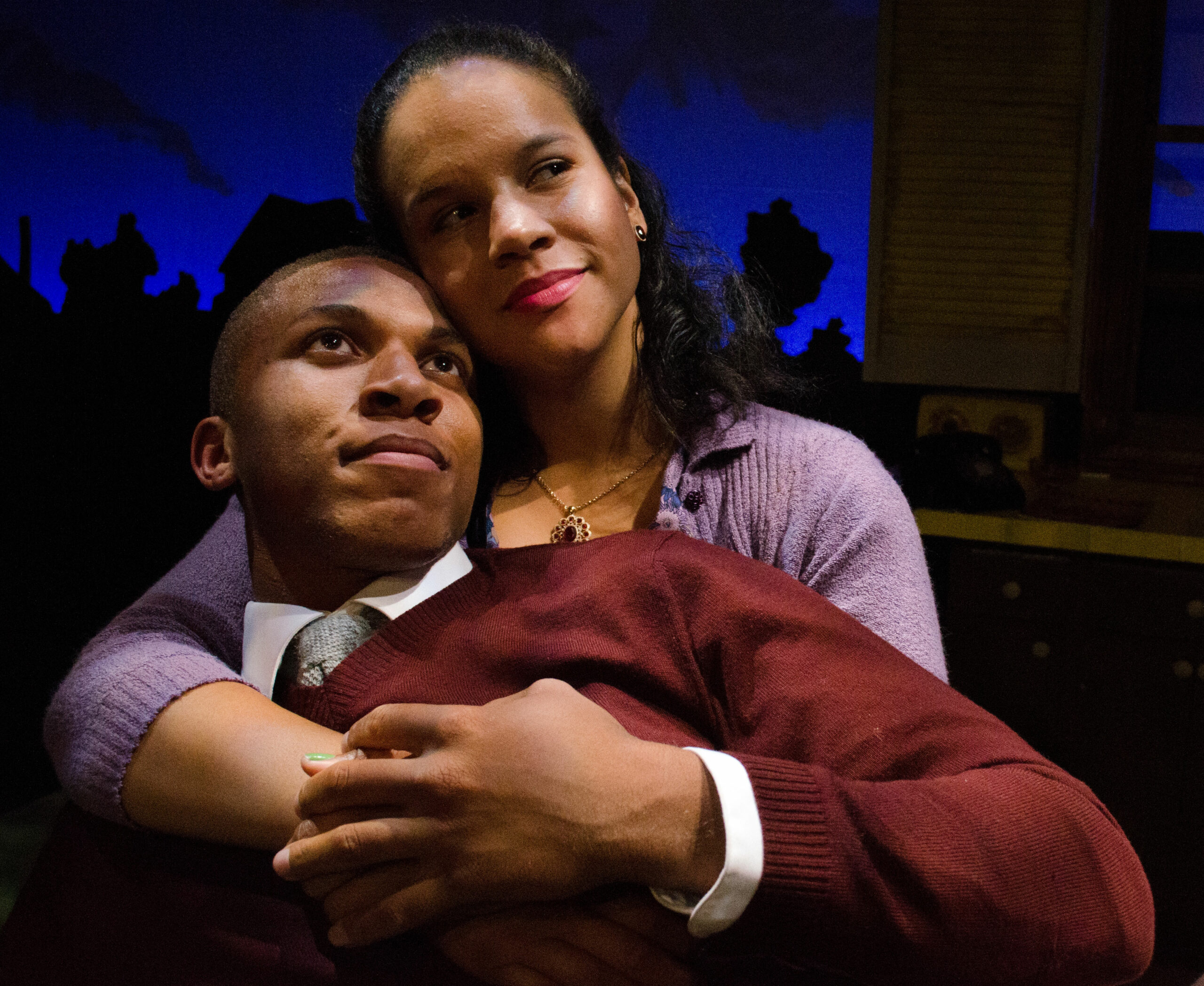
Slip/Shot at Seattle Public Theater
October 6, 2014Slip/Shot at Seattle Public Theater. Treavor Boykin as Monroe and Marquicia Dominguez as Euphrasie. Photo by Paul Bestock.
Earlier this weekend, I had the opportunity to see Slip/Shot by Jackie Goldfinger at Seattle Public Theater, directed by Kelly Kitchens. They have a short run (only one more weekend). I definitely think you should go see this play, but not because I liked it.
I did not enjoy this production as much as I wanted to. I found the script insufficient and the characters underdeveloped. I wanted more detail, from the very beginning, and although Kitchens and the design team and SPT tried to fill in as much as they could, it was not enough for me. But the script that was lacking, not the production itself. You should see this play and attend a well-done production with difficult subject matter told in a poignant and visceral manner.
Kelly Kitchens is a fantastic director. I’ve seen three of her plays so far this year (the other two were Arcadia and Black Comedy) and in each one, she wields unmatched skill in choreographing and articulating all of the bodies onstage when they all need to be in distinct times and spaces from each other. She is a clear storyteller, I just believe the story in Slip/Shot is not clearly expressed as a play, and it is one that needs to be told.
Early in the play, after we’ve met all of the characters, a young white security guard named Clem (Quinn Armstrong) accidentally shoots a young black man named Monroe (Treavor Boykin). It is 1963 in Tallahassee, so the fallout and consequences of Clem’s actions drive the story for the rest of the play. But I struggled with the minimal development of Monroe’s girlfriend and his mother as characters, because the outcome of their story is made clear early on. Yes, we learn about their past and their anxieties for the future, but their resolution is obvious from the beginning, so we are left waiting for them to come to the solution we’ve seen all along. What if they were more at odds throughout the play and not just at the beginning? What if they had to struggle harder to find their commonality, more than the built-in one of Monroe himself?
On the other side, Clem’s fate and that of his wife is more murky, and the playwright devotes a lot of time to figure out where they will end up. Their resolution is satisfying in its own way, but it left me wondering what the play is really about. Is it actually about a white man’s guilt for committing an accidental murder? Why can’t we watch a play about a mother losing her only son and the promise that he held instead? [Sidebar: I overheard someone in the bathroom later wondering “what was with all the books” and if the play was “about black literature, that wasn’t made clear.”]
That’s why I wanted more. As theatre artists, we have an opportunity for a (nearly) equally bi-racial cast but one character is under-utilized and the others aren’t given enough time to develop. [Sidebar: don’t have TWO white-guy emissaries. Combine them into one character. Please.] Each scene was so short, and ended so neatly, I found myself wondering during every scene change if all of my questions had been answered. Often, they were not. But each time, I’d be newly impressed by the quality of the lighting and sound design and how deftly and sweetly Kitchens had staged everyone.
After the play finished, I wondered what could be if Goldfinger had restructured the play entirely. What if she had begun the play with Monroe and his mother instead of Clem and his wife? What if she had established more of what life was like in Tallahassee in 1963 for these characters before completely turning their lives upside-down? What if she had employed flashbacks in order to utilize the actor playing Monroe more onstage? Would she have not felt the need to devote as much stage time to Clem and his wife’s waiting for their fate to be decided?
On the Seattle Public website, there is a lovely interview with one of the actors, Faith Russell. To her, the play is about “what we have in common and what unites us.” I do believe Goldfinger made a valiant attempt at showing the commonalities between families and the trials these families have onstage. She unites and parallels the two worlds onstage by exploring the concept of “moving forward,” since we are forced to by the nature of time. But as a work of theatre, we must stay in the difficult subject matter a little longer before we move forward, to make people truly think about a topic they’d much rather avoid.
Value and experience this production because everyone should have the opportunity to think about race in a part of America removed from us, in order to remind of us the realities in other parts of our country. See this show because the theatrical qualities are done well and the acting is good, all around. But we can do more. We need more plays like this, that go deeper and explore the potential tragedy and how we as human beings can continue to live, with an eye looking onto the past and a foot stepping toward the future.
Categorized in: Live Performance, Performance Reviews

